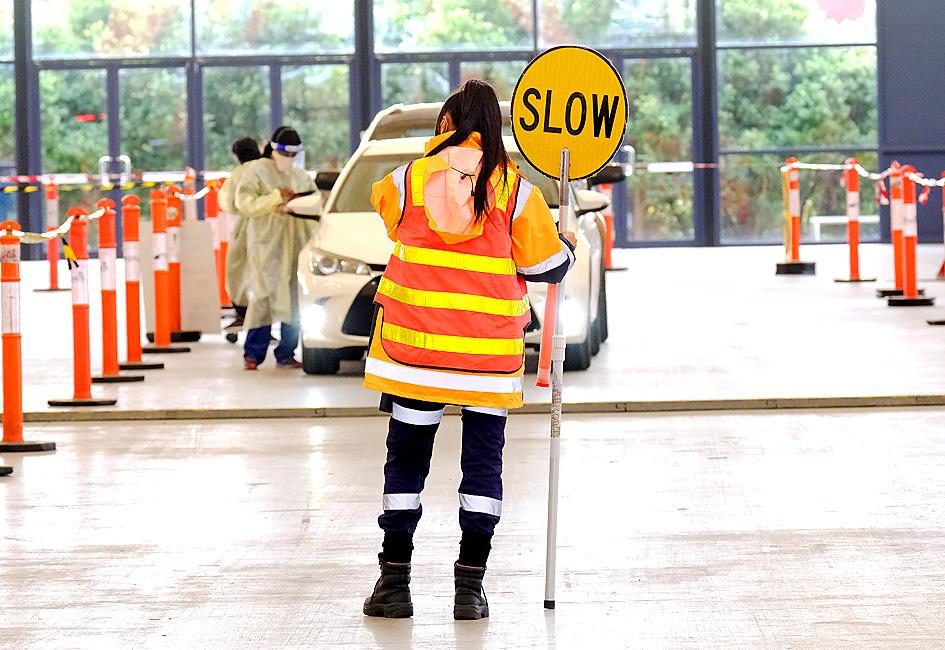S&P Global Ratings yesterday upgraded its outlook on Australia’s “AAA” sovereign rating to “stable” from “negative,” citing the nation’s “swift economic recovery” from the COVID-19 pandemic-driven recession.
Australia’s A$2 trillion (U$1.55 trillion) economy has rebounded sharply to above pre-pandemic levels thanks to its successful handling of the pandemic, together with massive fiscal and monetary stimulus.
S&P said it was more confident now that the government’s fiscal deficit would narrow toward 3 percent of GDP during the next two to three years after reaching an estimated 10 percent deficit in the current fiscal year that ends this month.

Photo: EPA-EFE
“The government’s policy response and strong economic rebound have reduced downside risks to our economic and fiscal outlook for Australia,” S&P said in a statement.
S&P added that its concern over Australia’s high level of external and household debt has been moderated by the nation’s strong track record of managing major economic shocks.
Australian Treasurer Josh Frydenberg welcomed the revised outlook, describing it as a “resounding expression of confidence” in the government’s economic management.
Australia is one of just nine countries in the world to boast an “AAA” credit rating from all three major ratings agencies.
It is among a handful of countries globally that can boast an economy that is larger now than before the pandemic.
On average, Australia’s rich world peers are 2.7 percent smaller than they were before the pandemic, research by Deloitte Access Economics showed, with the UK shrinking almost 9 percent, the EU contracting by 5 percent and the US 1 percent smaller.
Data out earlier showed Australia’s job advertisements climbed for a 12th straight month last month to reach their highest since 2008, prompting economists to predict the nation’s unemployment rate would fall to 4.4 percent by the end of next year from 5.5 percent now.

CHIP RACE: Three years of overbroad export controls drove foreign competitors to pursue their own AI chips, and ‘cost US taxpayers billions of dollars,’ Nvidia said China has figured out the US strategy for allowing it to buy Nvidia Corp’s H200s and is rejecting the artificial intelligence (AI) chip in favor of domestically developed semiconductors, White House AI adviser David Sacks said, citing news reports. US President Donald Trump on Monday said that he would allow shipments of Nvidia’s H200 chips to China, part of an administration effort backed by Sacks to challenge Chinese tech champions such as Huawei Technologies Co (華為) by bringing US competition to their home market. On Friday, Sacks signaled that he was uncertain about whether that approach would work. “They’re rejecting our chips,” Sacks

It is challenging to build infrastructure in much of Europe. Constrained budgets and polarized politics tend to undermine long-term projects, forcing officials to react to emergencies rather than plan for the future. Not in Austria. Today, the country is to officially open its Koralmbahn tunnel, the 5.9 billion euro (US$6.9 billion) centerpiece of a groundbreaking new railway that will eventually run from Poland’s Baltic coast to the Adriatic Sea, transforming travel within Austria and positioning the Alpine nation at the forefront of logistics in Europe. “It is Austria’s biggest socio-economic experiment in over a century,” said Eric Kirschner, an economist at Graz-based Joanneum

BUBBLE? Only a handful of companies are seeing rapid revenue growth and higher valuations, and it is not enough to call the AI trend a transformation, an analyst said Artificial intelligence (AI) is entering a more challenging phase next year as companies move beyond experimentation and begin demanding clear financial returns from a technology that has delivered big gains to only a small group of early adopters, PricewaterhouseCoopers (PwC) Taiwan said yesterday. Most organizations have been able to justify AI investments through cost recovery or modest efficiency gains, but few have achieved meaningful revenue growth or long-term competitive advantage, the consultancy said in its 2026 AI Business Predictions report. This growing performance gap is forcing executives to reconsider how AI is deployed across their organizations, it said. “Many companies

France is developing domestic production of electric vehicle (EV) batteries with an eye on industrial independence, but Asian experts are proving key in launching operations. In the Verkor factory outside the northern city of Dunkirk, which was inaugurated on Thursday, foreign specialists, notably from South Korea and Malaysia, are training the local staff. Verkor is the third battery gigafactory to open in northern France in a region that has become known as “Battery Valley.” At the Automotive Energy Supply Corp (AESC) factory near the city of Douai, where production has been under way for several months, Chinese engineers and technicians supervise French recruits. “They